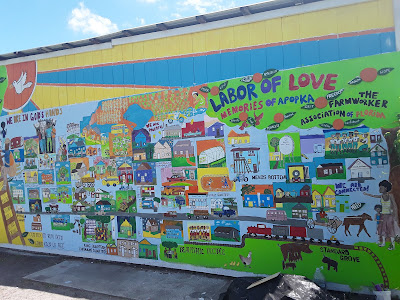The legacy of storytelling for America’s farmworkers
December 17, 2021
The legacy of storytelling for America’s farmworkers
The Farmworker Association of Florida’s (FWAF) mission is to build power among farmworkers and rural low-income communities, to respond to and gain control over the social, political, economic, workplace, health, and environmental justice issues that impact their lives. This mission was born out of the history of the injustices against the farmworkers, including those who were the laborers on the muck farms along the north shore of Lake Apopka that largely supported America’s food production from the 1940s until the late 1990s. The history of Lake Apopka is kept alive by the Toxic Tour of Lake Apopka, guided by FWAF staff member, who is the Pesticide Safety and Environmental Health Project Coordinator of FWAF.
A group of Americorps volunteers met at the FWAF office for an introduction to the history of Lake Apopka. What was once known as a premier bass fishing site in the 1940s, became one of the most polluted and toxic lakes in the United States by the 1990s. The persistent use of chemicals, fertilizers, and pesticides on the muck farms of the north shore of Lake Apopka led to a massive restoration effort. In an effort to restore Lake Apopka, the state bought the muck farms leaving an estimated 2,500 farmworkers without any work. Although millions of dollars were spent to restore Lake Apopka and study the effect of pesticide exposure on the wildlife, the farmworkers who were exposed to the same pesticides were forgotten.
A portion of the Toxic Tour was viewing the current landscape of Apopka that includes a medical waste incinerator and construction waste dump that spans acres of land. Ms. Economos educated the group on the importance of environmental justice and the reality of environmental racism within the historic neighborhood of farmworkers. Although the current landscape felt heavy and bleak, the storytelling of the farmworkers and their legacy and lives were the light of the tour. Participants of the tour were able to learn about the farmworker’s stories through viewing the Lake Apopka Farmworker Memorial Quilt and the “Labor of Love” mural in historic Apopka. The newly finished mural was bright and told a story of unity, love, and hope. The tour ended with the honor of meeting Linda Lee, a former farmworker and creator of the “Labor of Love” mural, at her home which resided on the land that was owned by her ancestors. She shared stories of the strenuous working conditions that her father and many other farmworkers endured working as citrus grove farmworkers. As she held a citrus sack, she described being like an “acrobat” climbing wooden ladders up ceiling trees to pick citrus and adding that you “can’t let it (the ladders) run you, you have to run it.” The farmworker’s stories are critical in the continued fight for advocacy for those who are still exposed to toxic pesticides and poor working conditions. Additionally, these stories are vital to remembering the past and restoring the dignity of those farmworkers’ hands that fed America.





Comments
Post a Comment